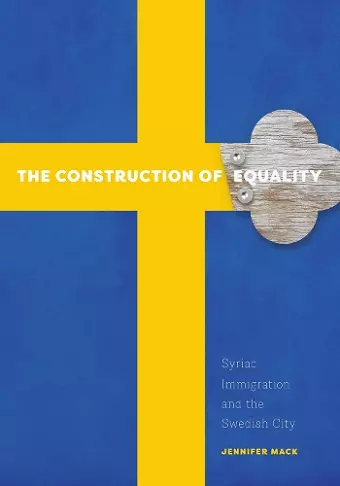The Construction of Equality
Syriac Immigration and the Swedish City
Format:Paperback
Publisher:University of Minnesota Press
Published:30th Oct '17
Currently unavailable, and unfortunately no date known when it will be back

An industrial city on the outskirts of Stockholm, Södertälje is the global capital of the Syriac Orthodox Christian diaspora, an ethnic and religious minority group fleeing persecution and discrimination in the Middle East. Since the 1960s, this Syriac community has transformed the standardized welfare state spaces of the city’s neighborhoods into its own “Mesopotälje,” defined by houses with Mediterranean and other international influences, a major soccer stadium, and massive churches and social clubs. Such projects have challenged principles of Swedish utopian architecture and planning that explicitly emphasized the erasure of difference. In The Construction of Equality, Jennifer Mack shows how Syriac-instigated architectural projects and spatial practices have altered the city’s built environment “from below,” offering a fresh perspective on segregation in the European modernist suburbs.
Combining architectural, urban, and ethnographic tools through archival research, site work, participant observation (among residents, designers, and planners), and interviews, Mack provides a unique take on urban development, social change, and the immigrant experience in Europe over a fifty-year period. Her book shows how the transformation of space at the urban scale—the creation and evolution of commercial and social districts, for example—operates through the slow accumulation of architectural projects. As Mack demonstrates, these developments are not merely the result of the grassroots social practices usually attributed to immigrants but instead are officially approved through dialogues between residents and design professionals: accredited architects, urban planners, and civic bureaucrats. Mack attends to the tensions between the “enclavization” practices of a historically persecuted minority group, the integration policies of the Swedish welfare state and its planners, and European nativism.
"The Construction of Equality is a timely and provocative book that makes a significant contribution to our understanding of the social and spatial politics of immigration and suburban development in Europe from the postwar period to the present, admirably complicating and enriching our understanding of both Europe and the Middle East."—Sheila Crane, University of Virginia
"The first Syriacs—members of a Christian minority from Turkey and the Middle East—arrived in Sweden as refugees a half-century ago. Jennifer Mack has been notably versatile in combining participant observation with a wide range of other materials to offer this rich portrayal of the community in its changing habitat. At a time of dramatic crisis reporting about new refugee streams, it is good to learn about how one group has made its way over time."—Ulf Hannerz, author of Writing Future Worlds
"Its approach to the Swedish welfare state, social democratic urban planning, and basic ideas on migration policies is thought-provoking and raises many important questions."—EuropeNow Journal
"This is an important, rich work that challenges currently dominant thoughts on Swedish suburban development."—Antipode
"The book not only shows the multiple facets of power relationships encountered by members of ethnic communities, but also provides significant arguments for the analysis of vernacular uses of spaces in their tasks. The Construction of Equality can be an important tool for understanding the cultural issues and political stakes that many professionals are confronted with when they try to involve refugees, immigrants, and ethnic communities in city development."—Buildings & Landscapes
"The book is well written and easy to follow and has carefully integrated illustrations."—Journal of Planning Education and Research
- Winner of The Construction of Equality 2018
ISBN: 9780816698714
Dimensions: 254mm x 178mm x 38mm
Weight: unknown
336 pages